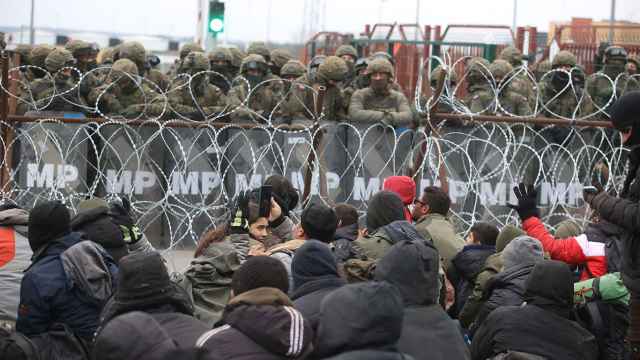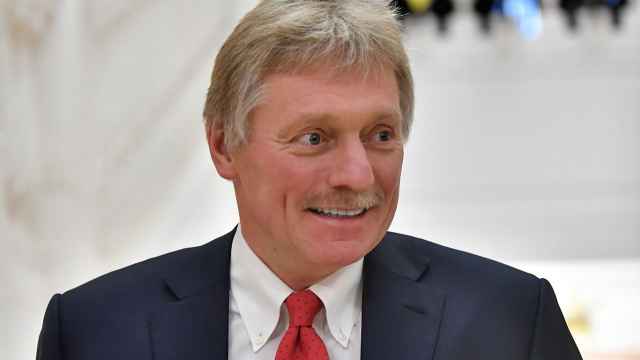Belarus held tense presidential polls on Sunday with a popular woman opposition candidate posing the greatest challenge in years to long-ruling strongman Alexander Lukashenko.
Svetlana Tikhanovskaya, a 37-year-old English teacher and translator by training, stood for office after the authorities detained her husband, popular blogger Sergei Tikhanovsky, and barred him from running.
She emerged as 65-year-old Lukashenko's strongest rival and her rallies drew tens of thousands across the country.
"I want honest elections," she told cheering supporters outside a polling station in Minsk.
Her presidential bid has sparked widespread calls for change in the ex-Soviet country of 9.5 million, which Lukashenko has ruled with an iron grip for the last 26 years.
At polling stations, many wore white bracelets that have become a symbol of the opposition. Tikhanovskaya wore one on each wrist.
"I hope something will change," said Vadim Svichkarev, a 49-year-old security guard. "It's very hard to be stuck in the same position for 26 years."
Alexander, a 47-year-old labourer, said "people are just tired of this absurdity, this constant stream of positive words on television and propaganda."
Tikhanovskaya, who has a 10-year-old son and five-year-old daughter, describes herself not as a politician but an "ordinary woman, a mother and wife."
She accused Lukashenko of showing blatant disregard for the people during the coronavirus epidemic, which the strongman has dismissed as a hoax.
She says that if she wins she will call fresh elections to include the entire opposition.
Tikhanovskaya's campaign office said Sunday that one of her key allies, Veronika Tsepkalo, had left for Russia out of concern for her safety.
Tsepkalo, whose ex-diplomat husband Valery Tsepkalo was barred from standing, and Maria Kolesnikova, campaign chief of ex-banker Viktor Babaryko who was also dropped from the polls and is in jail, joined forces with Tikhanovskaya to mount the campaign.
Photographs of the three standing together and making their signature gestures — Tikhanovskaya's punched fist, Kolesnikova's fingers in a heart shape and Tsepkalo's victory sign — have become an emblem of the opposition.
The first results were expected in the evening.
Tight security
Political observers predicted Lukashenko, who is seeking a sixth term, would rig the vote in the absence of international observers. He won over 83 percent at previous polls in 2015.
A record 41.7 percent of voters took part in early voting, the central electoral commission reported.
Official turnout stood at 65 percent at 2:00 pm local time, with polls due to close at 8:00 pm (1700 GMT).
"The elections will be falsified; there'll be a totally non-credible result," said Nigel Gould-Davies, a senior fellow at the International Institute for Strategic Studies and a former British ambassador to Belarus.
"The question is what happens then."
In the past Lukashenko has crushed protests with riot police and hefty jail terms, prompting Western sanctions.
"Given Lukashenko's ruthlessness, anyone who is concerned about Belarus will worry, will fear for the Belarusian people in the days ahead," Gould-Davies said.
Columns of army vehicles were seen on roads into Minsk, Belarusians wrote on social media, raising the prospect of military intervention.
In tight security measures, police carrying machine guns checked vehicles entering Minsk and government buildings were cordoned off.
Casting his vote, Lukashenko vowed to maintain order, suggesting his opponents may be planning unrest.
"Nothing will get out of control, I guarantee you ... whatever certain people have planned," the strongman said in comments shown on state television.
Police detained journalists including three from Russia's independent TV Rain.
Belarusians also reported problems with accessing websites of independent media.
'Wake up in new country'
Tikhanovskaya said ahead of polls she would not call for protests but urged supporters to help Belarusians "wake up in a new country."
She asked them to vote late Sunday to help prevent election fraud, while the electoral commission warned it could restrict access to polling stations.
An independent observer group, Right of Choice, said that at least 28 of its observers had been detained and others barred from polling stations.
Lukashenko has sought to galvanise support by warning of outside threats and raising the spectre of violent mobs.
Belarus has detained 33 Russians, describing them as mercenaries sent to destabilise the vote.
The detentions sparked a political crisis with ally Russia. Moscow urged the men's release and President Vladimir Putin told Lukashenko he wants Belarus to stay "stable."
Lukashenko has retained close ties to Moscow, though he often plays Russia and the West against each other.
Belarus has not held polls judged free and fair since 1995 and this time Minsk has not invited observers from the European OSCE observer group for the first time since 2001.
A Message from The Moscow Times:
Dear readers,
We are facing unprecedented challenges. Russia's Prosecutor General's Office has designated The Moscow Times as an "undesirable" organization, criminalizing our work and putting our staff at risk of prosecution. This follows our earlier unjust labeling as a "foreign agent."
These actions are direct attempts to silence independent journalism in Russia. The authorities claim our work "discredits the decisions of the Russian leadership." We see things differently: we strive to provide accurate, unbiased reporting on Russia.
We, the journalists of The Moscow Times, refuse to be silenced. But to continue our work, we need your help.
Your support, no matter how small, makes a world of difference. If you can, please support us monthly starting from just $2. It's quick to set up, and every contribution makes a significant impact.
By supporting The Moscow Times, you're defending open, independent journalism in the face of repression. Thank you for standing with us.
Remind me later.






